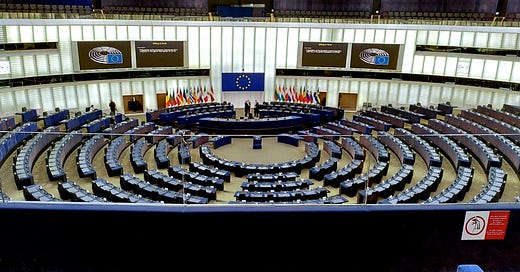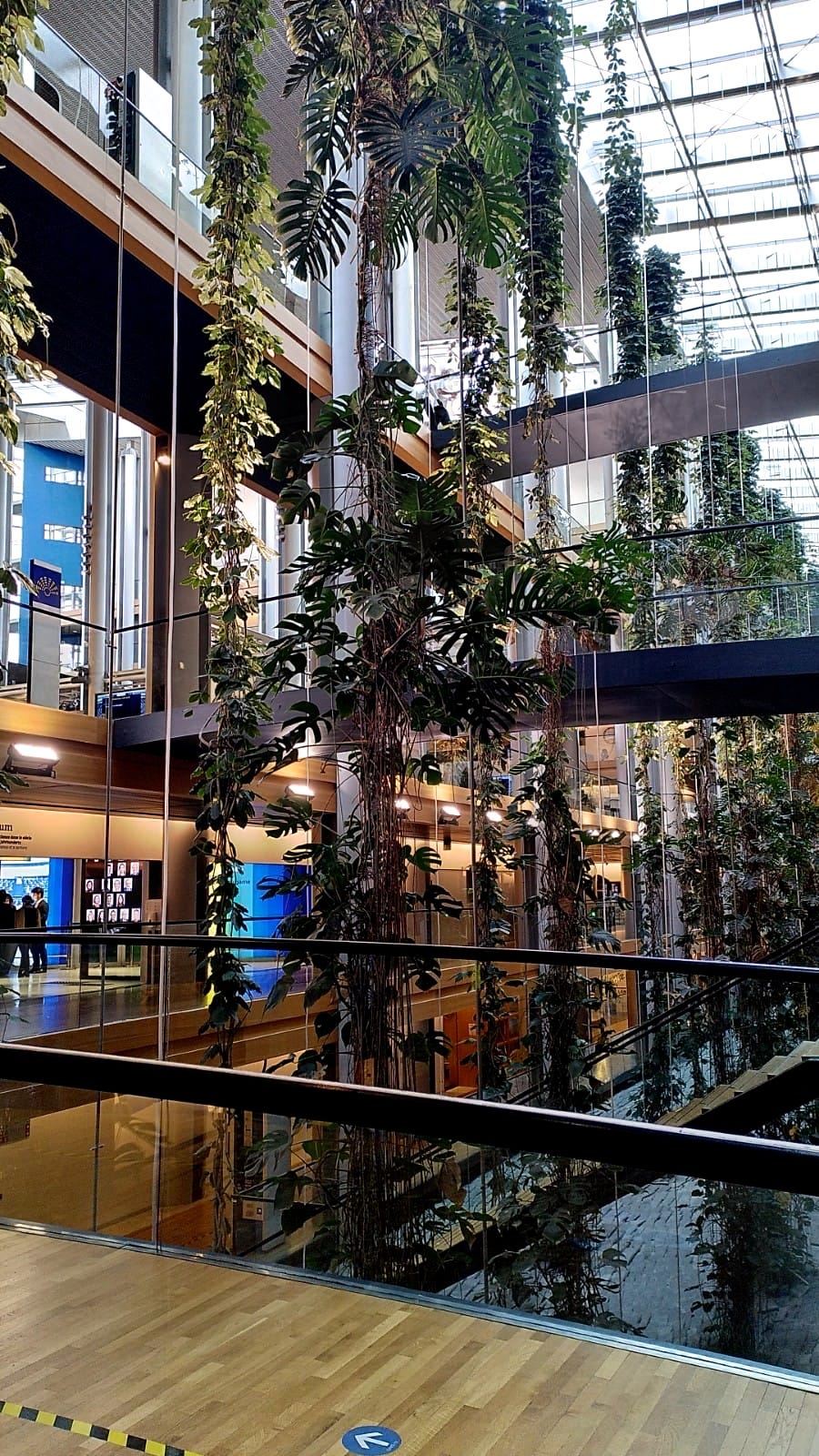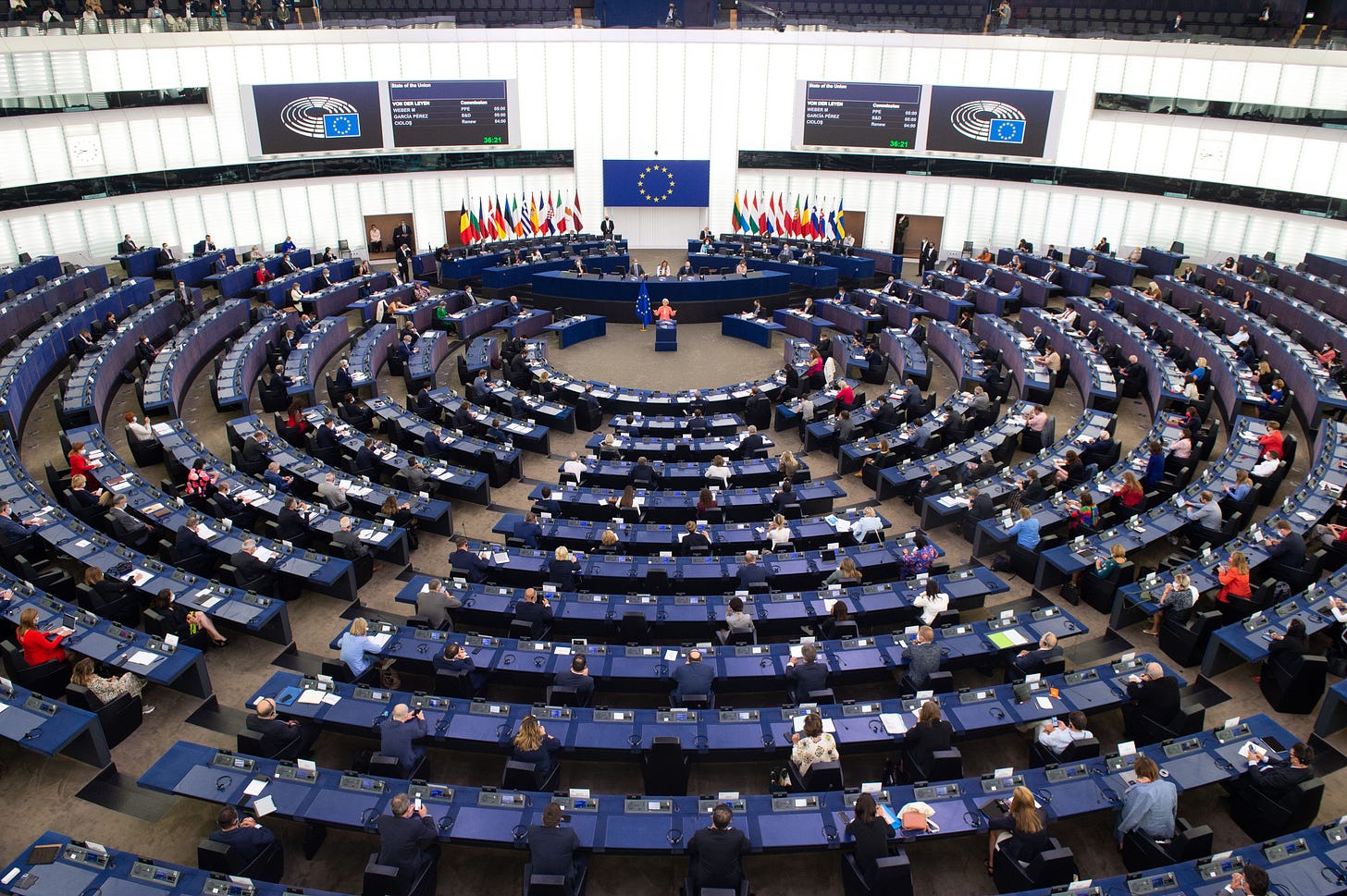S2E19. In the heart of the hemicycle
A trip to Strasbourg for the EU Parliament plenary session, with three resolutions on the Balkans: fight against organized crime, social and environmental rights in Serbia and Rule of Law in Slovenia
Hi,
welcome back to BarBalkans, the newsletter with blurred boundaries.
After Ljubljana and Naples, once again our trip takes us a bit far from the Balkans.
More precisely in Strasbourg, in France. One of the four capitals of the European Union, the headquarter of the EU Parliament.
It is here that the plenary session takes place. And this week the Western Balkans were at the center of the MEPs’ debate (Members of the European Parliament).
From organized crime to workers’ rights in Chinese companies in Serbia, from the Rule of Law in Slovenia to the environmental protests in Belgrade against mining projects along the Jadar river.
For a few days, even in Alsace we breathed some Balkan air.
What is the plenary
Let’s start with a brief summary for who is less familiar with European institutions.
What is the plenary session of the European Parliament?
A plenary session, by definition, is a meeting of all those who make up a collegial body. In other words, a session attended by all people entitled to participate.
In this case, we are talking about the plenary session of the only EU institution democratically elected by the 27 Member States’ citizens.
The total number of MEPs is 750, plus the President. After Brexit, they are 705.
In this term (started in 2019), MEPs are divided into 7 political groups. From the far left to the far right of the hemicycle:
The Left
The Progressive Alliance of Socialists and Democrats (S&D)
The Greens/European Free Alliance (Greens/EFA)
Renew Europe
The European People’s Party (EPP)
Identity and Democracy Party (ID)
The European Conservatives and Reformists (ECR)
The European Parliament is the legislative body (together with the governments of the Member States, gathered in the Council of the European Union) and the plenary session is the apex of the legislative process.
In the plenary session, discussions and final votes take place on the proposals submitted by the parliamentary committees and political groups.
The EU Parliament can express its opinion on any matter. Most of all, it can submit questions to the European Commission (the executive) and the Council of the EU (the co-legislator).
The plenary session is held every month for one week in Strasbourg. Committee work and additional meetings are held in Brussels.
This plenary (from Monday 13 to Thursday 16 December) was the last of 2021 and was held in hybrid format (in presence and remote), due to the COVID-19 restrictions.
Concerning the Western Balkans, two debates and three votes were held between Tuesday and Thursday.
Let’s have a look from the press tribune.
Strasbourg against organized crime
Let’s start with the most topical issue.
Lukas Mandl’s speech, as a member of the European People’s Party and rapporteur, gives us a glimpse of Tuesday’s plenary debate:
«Organized crime harms the confidence of citizens in their public institutions and it is a major obstacle for the efforts of the Western Balkans to develop their States and economies. The EU must not use organized crime as an excuse to delay the enlargement process, but should stand with the people of the Western Balkans».
With 531 votes in favor, 48 against and 117 abstentions, his report on cooperation on the fight against organized crime in the Western Balkans was approved.
The starting point is the fact that the Western Balkans are the origin, the destination and the transit countries of human trafficking, money laundering and firearms trafficking (as we have seen in our analysis).
The key-factors are the lack of job opportunities, corruption, misinformation, inequality and foreign interference from non-democratic regimes. Russia and China, in particular.
Since the fight against organized crime and European integration are mutually reinforcing, MEPs called for more efforts both from Brussels on the EU enlargement process and from the national governments in reforming and fighting corruption.
The EU must approve visa liberalization for citizens of Kosovo “without further delay”, as “isolation encourages criminal activities”, the report underlines.
But it is also imperative to eradicate the political and administrative links between high-level political figures and organized crime groups (maybe you remember one of the most recent newsletters).
These links existed even before the break-up of the former Yugoslavia. This is why the EU Parliament condemned the lack of willingness to open the UDBA archives (the Yugoslav Secret Service) “for the files to be returned to the respective governments if they so request”.
Last but not least, the importance of intelligence sharing with the European partners, with NATO and with international anti-drug and anti-corruption organizations.
Human rights breaches in Serbia
Two days later, it was the turn of human rights breaches in Serbia, as Fabio Massimo Castaldo, Italian MEP and vice-president of the EU Parliament (one out of 14), stated:
«About 500 Vietnamese are living in nightmarish conditions in a Chinese factory. Winter is coming and there is no heating and no warm clothes. Many of them would go home but they cannot, because their passports have been taken away».
The factory is Linglong Tire and the site is located in Zrenjanin, northern Serbia. This is where human rights breaches, human trafficking and forced labour are taking place.
This is denounced by a resolution of the EU Parliament, adopted with 586 votes in favor, 53 against and 44 abstentions.
«This is modern slavery», the Italian MEP affirmed: «This is not a dramatic situation on the other side of the world, but in Serbia, in the heart of Europe».
Considering the fact that labour laws were violated, the EU Parliament called on Belgrade to adopt a new law on the right to strike, to fight illegal work and to amend the law on inspection control.
By addressing the case of Linglong Tire, it urged the Serbian authorities to carefully investigate, to ensure the respect of fundamental rights in the factory and to “provide the EU with the conclusions of its investigations”, the text reads.
More generally, there is something more that worries MEPs.
“Serbia is increasing the number of contracts it has with major Chinese industrialists and granting China more and more legal privileges, even when these are contrary to EU law”.
This is leading to a growing influence of Beijing in all the Western Balkan region, as we have seen also in Montenegro.
«By signing to the EU accession process, Serbia has accepted specific social and environmental obligations that must be respected», MEP Castaldo recalled.
This statement brings us to the second hot topic for Belgrade.
It is all related to the Rio Tinto lithium mine (which we analyzed a few months ago) and the wave of protests that has been shaking the country for the last few weeks.
It was caused by “the rushed adoption of two laws”. In particular, the Law on Land Expropriation may open to controversial foreign investment projects, with a heavy impact on the environment.
The exercise of Serbian citizens’ fundamental right to peaceful assembly was violated by a serious amount of force by the police and attacks by unidentified armed groups.
Even if the government decided to withdraw and review the law, MEPs reported serious problems with corruption and violations of the Rule of Law in the environment area.
According to the resolution, there is a “general lack of transparency” over environmental and social impact assessments of infrastructure projects, including from “Chinese investments and loans as well as from multinational companies such as Rio Tinto”.
«It is our task to provide a concrete alternative with the Economic and Investment Plan and with the EU Global Gateway», the vice-president of the EU Parliament urged. «We have to show our partners that there is another path».
Shadows over Slovenia
This matter was not discussed in this plenary session (but in the previous one). In any case, it created a fuss in the corridors of the EU Parliament.
On Thursday, the resolution on fundamental rights and the Rule of Law in Slovenia was voted. It was supported by all political groups, except the EEP and right-wing groups (approved with 356 votes in favor, 284 against and 40 abstentions).
Several aspects raised concern over the country that holds the half-yearly Presidency of the Council of the EU, until the end of December (we have analyzed some criticality on BarBalkans).
According to the resolution, the EU Parliament “is deeply concerned about the level of public debate, climate of hostility, distrust and deep polarization in Slovenia, which has eroded trust in public bodies and between them”.
Prominent public figures, politicians and members of the government “have to lead by example” and they need to ensure “a respectful and civilized public debate, free from intimidation, attacks, slurs and harassment”.
The reference to Prime Minister Janez Janša has to be read between the lines. In October, he refused a meeting in Ljubljana with the delegation of the Committee on Civil Liberties (LIBE), in charge of monitoring the respect of the Rule of Law.


A central aspect in the resolution is the delayed nomination of the Slovenian EPPO prosecutors (the European Public Prosecutor’s Office, the independent EU body that investigates and prosecutes crimes affecting the EU budget).
Due to this delay, the European Public Prosecutor’s Office was fully established six months after the announcement of the operation. This is why MEPs called on the government to ensure the effective structural functioning of the EPPO in Slovenia.
Significant references were made to the “lack of effective enforcement of the anti-corruption rules” and the need for the government to fully respect the Constitution, the EU and international law, but also the principle of the separation of powers.
On human rights, the EU Parliament recommended that national authorities step up their efforts to respect human rights of asylum seekers and migrants, Roma communities and people living in poverty.
Finally, completing the worrying picture of the Rule of Law in Slovenia, threats, interference and pressure on the editorial policy of STA news agency and RTV Slovenija public radio and television service.
Pit stop. Sittin’ at the BarBalkans
We have reached the end of this piece of road.
At this time of year, Strasbourg is famous for the Christmas markets.
Any self-respecting Christmas market offers glühwein, glögg, vin brûlé, or mulled wine, as you prefer to call it.
Today at out bar, the BarBalkans, we find a cup of kuhano vino. Another typical Balkan Christmas drink, after last week’s hot rakija.
This is how mulled wine is called and prepared from Croatia to Serbia, from Montenegro to Slovenia.
The drink is made from red or white wine, with combinations of nutmeg, cloves, cinnamon, brown sugar, orange juice and peel.
To prepare it, you have to put all the ingredients in a pot: 100 milliliters of orange juice, 150 grams of sugar, a cinnamon stick, a teaspoon of nutmeg, 5 cloves.
Then, pour in the wine to cover the whole mixture and cook on medium temperature for 5 minutes.
Pour in the rest of the wine and simmer for another 5 minutes.
Kuhano vino is ready to be served with a slice of orange!
Let’s continue the BarBalkans journey. We will meet again in a week, for the 20th stop.
A big hug and have a good journey!
Christmas is only a week away. Have you already thought about what you will put under the tree?
If you still need a suggestion and if you think this newsletter is inspiring, you could give a gift subscription to BarBalkans to anyone you want.
Just click below, choose the option you prefer and to whom you want to give it. You can also personalize the gift or you can make it anonymous (for a perfect Secret Santa!)
BarBalkans is a free newsletter. So, what will be the gift?
Every second Wednesday of the month, the recipient (or yourself, if you like) will receive an article/podcast by e-mail, turning the clock back exactly 30 years.
From month to month, they will find out what was happening - right in that month - during the dissolution of Yugoslavia, from 1991 onwards (you can see a preview here).
The starting point is an audio contribution - testimonies and songs- continuing with the written and photographic narrative of what they need to know about the ten years of war in former Yugoslavia.
In order to understand contemporary Balkan history and the present, as we see it now.










